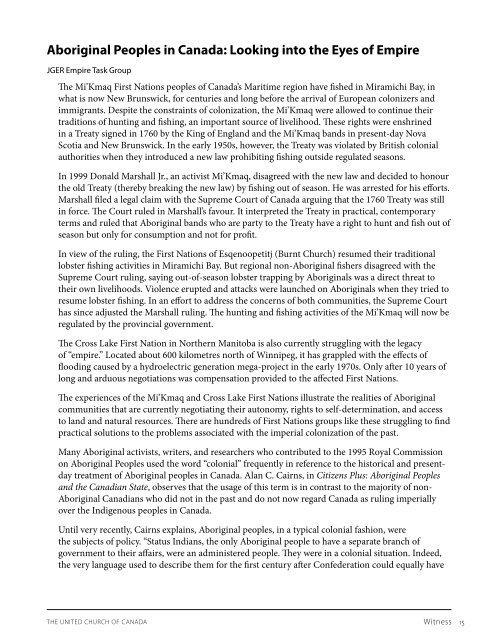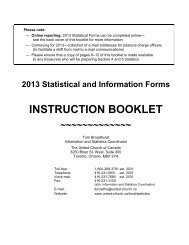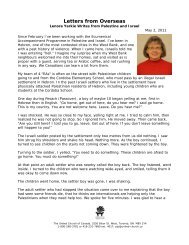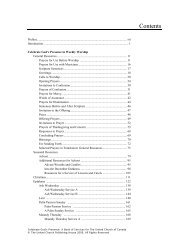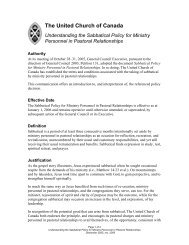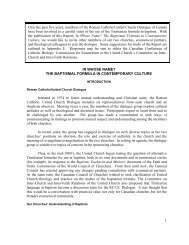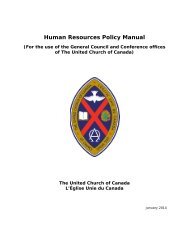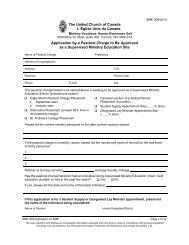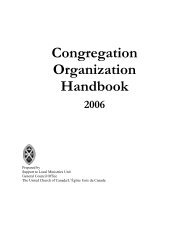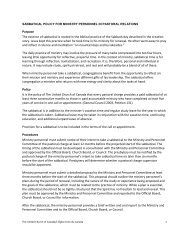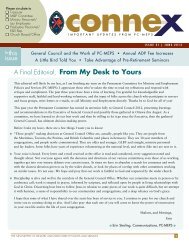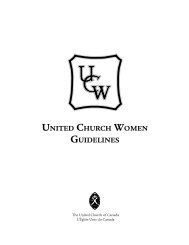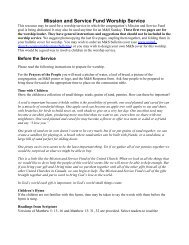Living Faithfully in the Midst of Empire - The United Church of Canada
Living Faithfully in the Midst of Empire - The United Church of Canada
Living Faithfully in the Midst of Empire - The United Church of Canada
Create successful ePaper yourself
Turn your PDF publications into a flip-book with our unique Google optimized e-Paper software.
Aborig<strong>in</strong>al Peoples <strong>in</strong> <strong>Canada</strong>: Look<strong>in</strong>g <strong>in</strong>to <strong>the</strong> Eyes <strong>of</strong> <strong>Empire</strong><br />
JGER <strong>Empire</strong> Task Group<br />
<strong>The</strong> Mi’Kmaq First Nations peoples <strong>of</strong> <strong>Canada</strong>’s Maritime region have fished <strong>in</strong> Miramichi Bay, <strong>in</strong><br />
what is now New Brunswick, for centuries and long before <strong>the</strong> arrival <strong>of</strong> European colonizers and<br />
immigrants. Despite <strong>the</strong> constra<strong>in</strong>ts <strong>of</strong> colonization, <strong>the</strong> Mi’Kmaq were allowed to cont<strong>in</strong>ue <strong>the</strong>ir<br />
traditions <strong>of</strong> hunt<strong>in</strong>g and fish<strong>in</strong>g, an important source <strong>of</strong> livelihood. <strong>The</strong>se rights were enshr<strong>in</strong>ed<br />
<strong>in</strong> a Treaty signed <strong>in</strong> 1760 by <strong>the</strong> K<strong>in</strong>g <strong>of</strong> England and <strong>the</strong> Mi’Kmaq bands <strong>in</strong> present-day Nova<br />
Scotia and New Brunswick. In <strong>the</strong> early 1950s, however, <strong>the</strong> Treaty was violated by British colonial<br />
authorities when <strong>the</strong>y <strong>in</strong>troduced a new law prohibit<strong>in</strong>g fish<strong>in</strong>g outside regulated seasons.<br />
In 1999 Donald Marshall Jr., an activist Mi’Kmaq, disagreed with <strong>the</strong> new law and decided to honour<br />
<strong>the</strong> old Treaty (<strong>the</strong>reby break<strong>in</strong>g <strong>the</strong> new law) by fish<strong>in</strong>g out <strong>of</strong> season. He was arrested for his efforts.<br />
Marshall filed a legal claim with <strong>the</strong> Supreme Court <strong>of</strong> <strong>Canada</strong> argu<strong>in</strong>g that <strong>the</strong> 1760 Treaty was still<br />
<strong>in</strong> force. <strong>The</strong> Court ruled <strong>in</strong> Marshall’s favour. It <strong>in</strong>terpreted <strong>the</strong> Treaty <strong>in</strong> practical, contemporary<br />
terms and ruled that Aborig<strong>in</strong>al bands who are party to <strong>the</strong> Treaty have a right to hunt and fish out <strong>of</strong><br />
season but only for consumption and not for pr<strong>of</strong>it.<br />
In view <strong>of</strong> <strong>the</strong> rul<strong>in</strong>g, <strong>the</strong> First Nations <strong>of</strong> Esqenoopetitj (Burnt <strong>Church</strong>) resumed <strong>the</strong>ir traditional<br />
lobster fish<strong>in</strong>g activities <strong>in</strong> Miramichi Bay. But regional non-Aborig<strong>in</strong>al fishers disagreed with <strong>the</strong><br />
Supreme Court rul<strong>in</strong>g, say<strong>in</strong>g out-<strong>of</strong>-season lobster trapp<strong>in</strong>g by Aborig<strong>in</strong>als was a direct threat to<br />
<strong>the</strong>ir own livelihoods. Violence erupted and attacks were launched on Aborig<strong>in</strong>als when <strong>the</strong>y tried to<br />
resume lobster fish<strong>in</strong>g. In an effort to address <strong>the</strong> concerns <strong>of</strong> both communities, <strong>the</strong> Supreme Court<br />
has s<strong>in</strong>ce adjusted <strong>the</strong> Marshall rul<strong>in</strong>g. <strong>The</strong> hunt<strong>in</strong>g and fish<strong>in</strong>g activities <strong>of</strong> <strong>the</strong> Mi’Kmaq will now be<br />
regulated by <strong>the</strong> prov<strong>in</strong>cial government.<br />
<strong>The</strong> Cross Lake First Nation <strong>in</strong> Nor<strong>the</strong>rn Manitoba is also currently struggl<strong>in</strong>g with <strong>the</strong> legacy<br />
<strong>of</strong> “empire.” Located about 600 kilometres north <strong>of</strong> W<strong>in</strong>nipeg, it has grappled with <strong>the</strong> effects <strong>of</strong><br />
flood<strong>in</strong>g caused by a hydroelectric generation mega-project <strong>in</strong> <strong>the</strong> early 1970s. Only after 10 years <strong>of</strong><br />
long and arduous negotiations was compensation provided to <strong>the</strong> affected First Nations.<br />
<strong>The</strong> experiences <strong>of</strong> <strong>the</strong> Mi’Kmaq and Cross Lake First Nations illustrate <strong>the</strong> realities <strong>of</strong> Aborig<strong>in</strong>al<br />
communities that are currently negotiat<strong>in</strong>g <strong>the</strong>ir autonomy, rights to self-determ<strong>in</strong>ation, and access<br />
to land and natural resources. <strong>The</strong>re are hundreds <strong>of</strong> First Nations groups like <strong>the</strong>se struggl<strong>in</strong>g to f<strong>in</strong>d<br />
practical solutions to <strong>the</strong> problems associated with <strong>the</strong> imperial colonization <strong>of</strong> <strong>the</strong> past.<br />
Many Aborig<strong>in</strong>al activists, writers, and researchers who contributed to <strong>the</strong> 1995 Royal Commission<br />
on Aborig<strong>in</strong>al Peoples used <strong>the</strong> word “colonial” frequently <strong>in</strong> reference to <strong>the</strong> historical and presentday<br />
treatment <strong>of</strong> Aborig<strong>in</strong>al peoples <strong>in</strong> <strong>Canada</strong>. Alan C. Cairns, <strong>in</strong> Citizens Plus: Aborig<strong>in</strong>al Peoples<br />
and <strong>the</strong> Canadian State, observes that <strong>the</strong> usage <strong>of</strong> this term is <strong>in</strong> contrast to <strong>the</strong> majority <strong>of</strong> non-<br />
Aborig<strong>in</strong>al Canadians who did not <strong>in</strong> <strong>the</strong> past and do not now regard <strong>Canada</strong> as rul<strong>in</strong>g imperially<br />
over <strong>the</strong> Indigenous peoples <strong>in</strong> <strong>Canada</strong>.<br />
Until very recently, Cairns expla<strong>in</strong>s, Aborig<strong>in</strong>al peoples, <strong>in</strong> a typical colonial fashion, were<br />
<strong>the</strong> subjects <strong>of</strong> policy. “Status Indians, <strong>the</strong> only Aborig<strong>in</strong>al people to have a separate branch <strong>of</strong><br />
government to <strong>the</strong>ir affairs, were an adm<strong>in</strong>istered people. <strong>The</strong>y were <strong>in</strong> a colonial situation. Indeed,<br />
<strong>the</strong> very language used to describe <strong>the</strong>m for <strong>the</strong> first century after Confederation could equally have<br />
THE UNITED CHURCH OF CANADA<br />
Witness 15


